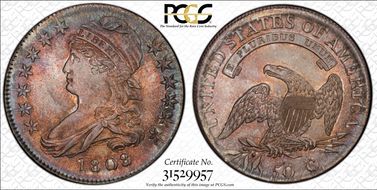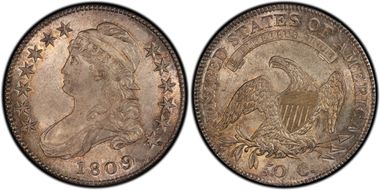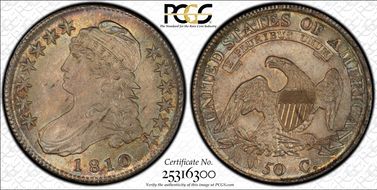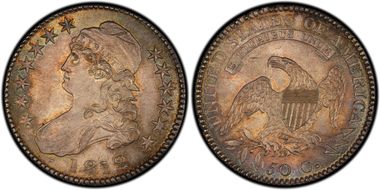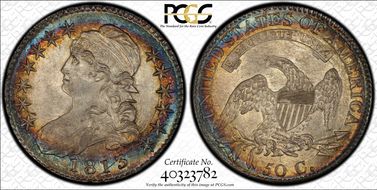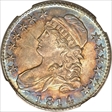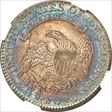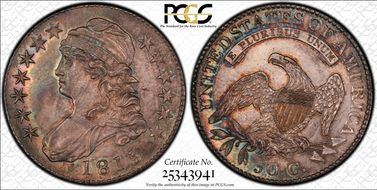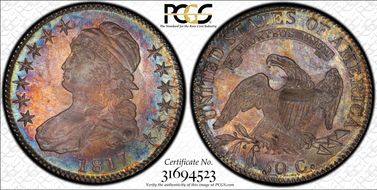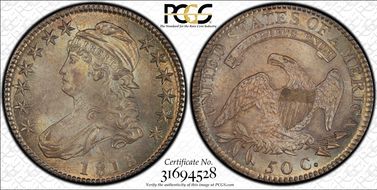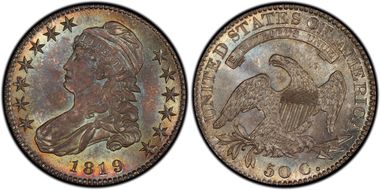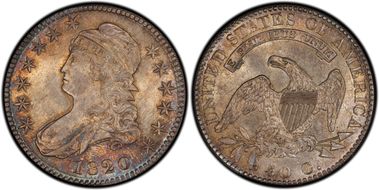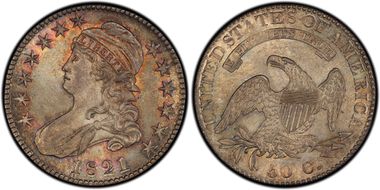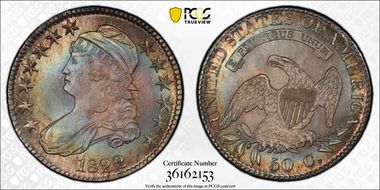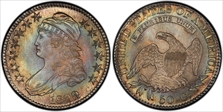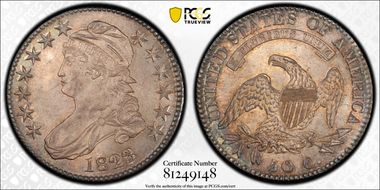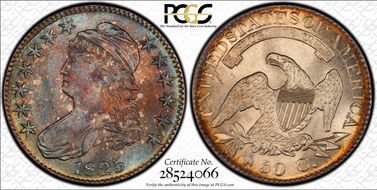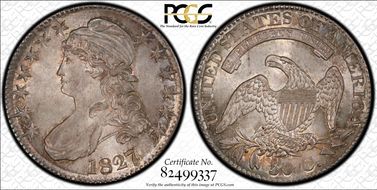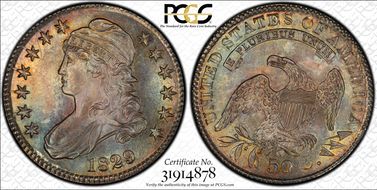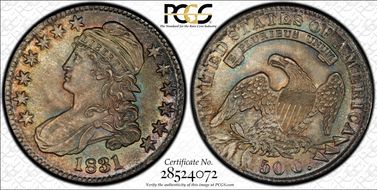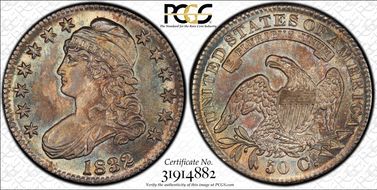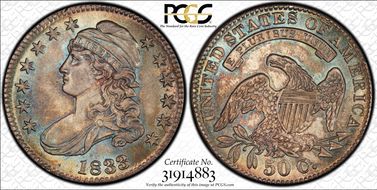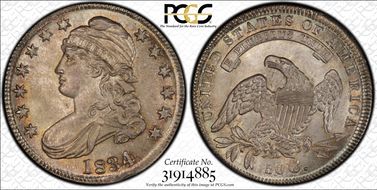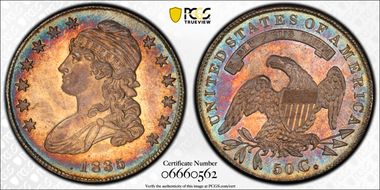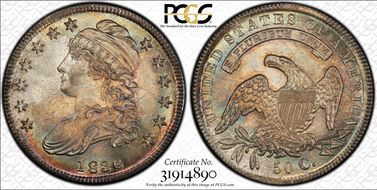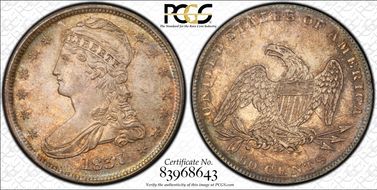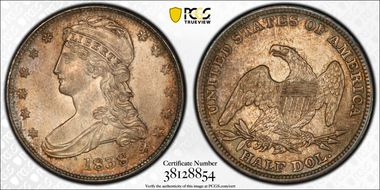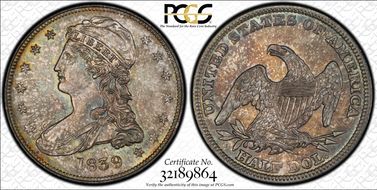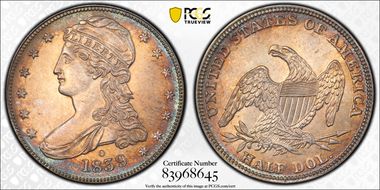The Link Early American Silver Date Set of Lettered and Reeded Edge Capped Bust Half Dollars 的钱币相册
O.114 R3. CAC. Norweb. Pogue. Finest Known 1807 Capped Half Dollar.
O-103 R1. Pogue. Finest Known. CAC. Obtained fromStacks Bowers Auction of the D. Brent Pogue Collection on September 30, 2015, Lot 2005.
O.106 R3. CAC. Eliasberg. Pogue. Finest Known 1809 Half Dollar.
O-108 R3. Newman. CAC. Finest Known 1810 Half Dollar. Fantastic creamy orginal surfaces with stunning eye appeal for an 1810 half dollar. Crossed from NGC MS66.
O.107a R1. CAC. Green, Newman, Simpson. Finest Known 1813 Capped Half Dollar by a country mile. Per cataloger, "Sole Finest. Ex: Green-Newman. Diagnostic markers for the O-107 die pair include a horizontal line through Liberty's hair curls and ribbon, and a die line from the leftmost leaf tip to the dentil. Most survivors from this die pair are in a later state with cracks through the arrowheads and denomination. The present coin is two full grading points finer than any other example of an 1813 O-107 (or O-107a) half dollar, clearly taking top spot on Stephen Herrman's Condition Census. It is actually one of only 26 Capped Bust halves certified at PCGS for any year between 1807 and 1836, and just two individual coins for all years are graded higher at that service. What might one say about a coin of this caliber? It is everything one would expect of the stratospheric MS67 designation. The coin is truly "as struck" in terms of luster and preservation, with the joyous addition of iridescent color through the stars and legend. The luminous silver centers are surrounded by champagne-gold and electrified cobalt-blue toning. This Superb Gem combines Registry Set technical quality with breathtaking eye appeal in one irresistible package. There is no question that bidders will enjoy an exhilarating experience competing for this remarkable, impeccably pedigree half dollar. Ex: "Colonel" E.H.R. Green; Green Estate; Partnership of Eric P. Newman / B.G. Johnson d.b.a. St. Louis Stamp & Coin Co.; Eric P. Newman @ $5.00; Eric P. Newman Numismatic Education Society; Newman Collection, Part II (Heritage, 11/2013), lot 33444." Obtained from Heritage Auction of the Robert Simpson Collection, Part 1 on September 17, 2020, Lot 10078.
O-103 R1. CAC. Finest Known 1814 half dollar by grade. Actually, tied for another coin graded MS66+ IMHO. Per Heritage cataloger, "marvelous preservation and toning. This available die pairing is recognized on the obverse by star 7, which has one point at the juncture of the upper and lower curls on Liberty's forehead. Most examples, including the present one, show die clashing in obverse fields. Multiple vertical die lines run down to the rim from below the forward portion of the bust. On the reverse, a heavy defect ridge or die line runs from the scroll beneath the initial E, downward to the center of the left (facing) wing. The mint luster, thick and frosted, displays abundantly evident through the toning. The centers are silver-gray, with a light accent of rose surrounded by cobalt-blue at the extreme margins on each side. As is the case for many 1814 half dollars, this piece is quite sharply struck (although, as the Overton reference points out, that sharp strike came at the expense of sharp die clashing when there was no intervening planchet). As demanded at this incredible grade level, there are no visible abrasions or adjustment marks, save for the aforementioned die clashing in the fields." Crossed from NGC MS68* to PCGS in September of 2016. Obtained from Heritage US Coins Signature Auction- Long Beach #1171 on May 31, 2012, Lot 3777.
O-103 R1. CAC. Finest Known 1814 half dollar by grade. Actually, tied for another coin graded MS66+ IMHO. Per Heritage cataloger, "marvelous preservation and toning. This available die pairing is recognized on the obverse by star 7, which has one point at the juncture of the upper and lower curls on Liberty's forehead. Most examples, including the present one, show die clashing in obverse fields. Multiple vertical die lines run down to the rim from below the forward portion of the bust. On the reverse, a heavy defect ridge or die line runs from the scroll beneath the initial E, downward to the center of the left (facing) wing. The mint luster, thick and frosted, displays abundantly evident through the toning. The centers are silver-gray, with a light accent of rose surrounded by cobalt-blue at the extreme margins on each side. As is the case for many 1814 half dollars, this piece is quite sharply struck (although, as the Overton reference points out, that sharp strike came at the expense of sharp die clashing when there was no intervening planchet). As demanded at this incredible grade level, there are no visible abrasions or adjustment marks, save for the aforementioned die clashing in the fields." Crossed from NGC MS68* to PCGS in September of 2016. Obtained from Heritage US Coins Signature Auction- Long Beach #1171 on May 31, 2012, Lot 3777.
O.101 R2. Finest Known of this key date. A+ Eye Appeal. Per Heritage cataloger, "Ex: Kaufman. Numismatists and collectors who seek a complete date collection must acquire an 1815 half dollar. Similarly, die variety specialists require an example, and those who seek die states must have two different pieces. Many design type collectors have the formation of a complete type set of key-date coins as their goal, and the 1815 half dollar is the best candidate. Finally, a growing trend is the acquisition of "trophy coins," those pieces that combine rarity, quality, and exceptional aesthetic appeal, and this Premium Gem 1815 half dollar combines all of those factors. Demand for a specimen such as this rarity has never been higher. The finest 1815 half dollars are the present early die state piece and the Eliasberg Gem late die state specimen. Following these two pieces, we find approximately 20 other auction records of MS63 and MS64 coins over the last 20 years. However, we have no hesitation calling the present piece the finest known 1815 half dollar. It has bold central details with an almost medallic appearance, the stars at the left border are strong while those to the right are weak. Both sides have soft, frosty silver luster with grayish-gold patina, surrounded by blue-green, gold, rose, and iridescent toning. The surfaces are well-preserved, with no evidence of mishandling. This Premium Gem is one of the landmark opportunities in the current sale, and once sold, may not appear on the market for many years. Ex: The Chicago Sale (RARCOA and David W. Akers, Inc., 8/1991), lot 523; Central States Signature (Heritage, 4-5/2009), Lot 2415 per Heritage cataloger. Obtained from Heritage Platinum Auction on August 8, 2012, Lot 5143. Crossed from NGC MS66+ to PCGS MS66.
O-110a Finest Known 1817 Half Dollar. One of the most visually stunning capped Bust Halves in existence according to a survey of those who love the series. Must be seen to be appreciated.
O-106. CAC. R3. Finest Known 1822 Half Dollar. Blazing cartwheel luster and color with pristine surfaces. Visually stunning eye appeal. Obtained by private treaty from Numismatic Americana on August 15, 2018.
O-106. CAC. R3. Finest Known 1822 Half Dollar. Blazing cartwheel luster and color with pristine surfaces. Visually stunning eye appeal. Obtained by private treaty from Numismatic Americana on August 15, 2018.
O-107 R1. Eliasberg. Tied Finest Known 1823 Half Dollar at PCGS and Finest Known at NGC. This coin was the only coin that either NGC or PCGS graded MS67. Lovely satin surfaces that are exceptionally clean. Strong sparkling cartwheel luster. From Louis E. Eliasberg, Sr. Estate (Bowers and Merena, April 1997, Lot 1795.
O-117 R1. CAC. Finest known of the die marriage. Per cataloger, "O-117. PCGS graded MS-66. CAC Approved PQ. Boldly struck with lovely toning on both sides. Two mint-made spikes from the left (facing) wing identify this die pairing. One of the finest graded of this date by PCGS, tied with a few others, with a Mint State 68 graded higher by that service. Brilliant luster plus toning so beautiful on the obverse over especially bright luster one has to give it extra emphasis. The reverse similar, but rather than mostly golden color, now with lovely delicate blue and lilac toning throughout. Boldly struck making this high in the condition census for the variety, and date too! If you have long been searching for a really special coin, a spectacular offering, one that boasts original toning, and one that is very high grade, then look no further than this lot. One of the highlights of the Half Dollar section of the sale, and certain excite even the most advanced collector. Pop 6; 1 finer in 68." Obtained from Goldberg Auction on February 3, 2013, Lot 1319.Lot
O.104 R4+. "This half dollar is so much more than a Premium Gem. It has amazing eye appeal with green, rose, and iridescent toning on the obverse, and light gold on the reverse. The strike is bold and well-centered, and the surfaces are highly lustrous and pristine. An amazing example, but also an extremely important offering," per Heritage cataloger. Obtained from Heritage Galleries' Auction Auction #1175 on October 12, 2012.
O-109 R3. CAC. Green. Newman. Finest Known 1828 Square 2 Large 8 Half Dollar. Crossed from NGC MS66+.
O-115 R.2. CAC. OGH. Tied Finest Known 1830 Small O Capped Bust Half Dollar. Rich natural toning. Per cataloger, "A bold and brilliant luster glows vividly below a rich layer of deeper olive, warm peach-rose, lavender, teal, slate, and gold hues blend together with the underlying original silver peaking through in places. Silky smooth surfaces are PRISTINE and the strike is wonderfully and fully rendered from an exacting blow from the dies. The eye appeal is excellent and very high end!" Prior: Goldberg Auction February 4, 2009, Lot 949. Obtained from Legend Auction of the perfection Collection on September 8, 2022, Lot
O-115 R.2. CAC. OGH. Tied Finest Known 1830 Small O Capped Bust Half Dollar. Rich natural toning. Per cataloger, "A bold and brilliant luster glows vividly below a rich layer of deeper olive, warm peach-rose, lavender, teal, slate, and gold hues blend together with the underlying original silver peaking through in places. Silky smooth surfaces are PRISTINE and the strike is wonderfully and fully rendered from an exacting blow from the dies. The eye appeal is excellent and very high end!" Prior: Goldberg Auction February 4, 2009, Lot 949. Obtained from Legend Auction of the perfection Collection on September 8, 2022, Lot
O-107 R3. CAC. Second Finest Known 1831 Capped Half Dollar. Visually stunning, very flashy, wow colors and pizazz! Obtained from Harry Laibstain Rare Coins by private treaty on January 10, 2013.
O-109 R2. CAC. Eliasberg, Jung. Finest Known 1835 Capped Bust Half Dollar. Stellar eye appeal with proof life surfaces and blue and orange concentric toning. Eliasberg, Jung, Kaufman. Per Heritage cataloger, "Possible Presentation Strike. Ex: Eliasberg/Kaufman. O-109, R.2. Both dies are perfect on this remarkable piece. The obverse has star 7 minutely recut, and the flag of the 5 is long and straight with only a tiny upward curve at its tip. In the Eliasberg catalog, this beauty was presented as "possibly a presentation striking" and "far and away the finest known." Original 1835 proof half dollars are extremely rare, as most proofs of this date are technically restrikes with the edge lettering crushed. The restrikes were made a short time later, perhaps in 1836. This Superb Gem has incredible surfaces with fully prooflike fields, save for tiny areas of mint frost in the left obverse field. While clearly not a proof, this beautiful example was carefully produced, and is an attractive representative of the 1835 coinage issues that approached the end of an era, before steam power was introduced late the next year. Easily the finest known example, this piece is one of half a dozen MS63 or finer examples of the variety known to us. Both sides have an amazing strike with all details boldly defined, a few stars at the left being the only exception. The obverse has brilliant gold toning with incredible rose, lilac, and blue peripheries. The reverse is deeper in appearance but similarly toned. Census: 1 in 67 ★. Ex: Louis E. Eliasberg, Sr.; Eliasberg Estate (Bowers and Merena, 4/1997), lot 1899. From the Joseph C. Thomas Collection." Obtained from the Oliver Jung "The Type Set" by private treaty with Joe O'Connor on 9/1/2019.
GR-18 CAC. R.1 Lovely original tan surfaces with outstanding eye appeal. Among the finest known of all 1837 halves, and very competitive in coins in MS67 holders (one of which I turned down for this current one). Per cataloger, "Beautiful 1837 Reeded Edge Half Dollar. Condition Census. 1837 Capped Bust Half Dollar. Reeded Edge. 50 CENTS. GR-18. Rarity-1. MS-66 (PCGS). CAC. This is a stunning example of a short-lived, design type in the Capped Bust half dollar series. Soft sandy-silver patina is enhanced with wisps of iridescent olive-russet and champagne-apricot highlights that are largely confined to the peripheries. Intense satin luster is seen throughout and the striking detail is sharp to full. This is easily one of the most carefully preserved, visually appealing examples of the Capped Bust, Reeded Edge, 50 CENTS half dollar that we have ever offered. It is sure to see spirited bidding among advanced specialists and Gem type collectors. This short-lived type, produced only in 1836 and 1837, came about through the introduction of steam coinage to the United States Mint. The first working dies for the Reeded Edge Capped Bust half dollar were completed by Christian Gobrecht during the autumn of 1836. The type is superficially similar to that of its Lettered Edge predecessor, although Liberty's portrait and the eagle have a more refined look, the scroll on which the Latin motto E PLURIBUS UNUM was engraved in the upper reverse field is gone, and the diameter is smaller and more uniform within a beaded border. The final-listed refinement, in particular, was meant to accommodate the close collar, a new innovation to the United States made possible by the introduction of the steam press. The close collar allowed the Mint to produce half dollars not only of a uniform diameter, but also with a reeded edge for the first time. A final innovation of the revolutionary Reeded Edge half dollar is a revised weight standard of 13.36 grams, as stipulated by the Act of January 18, 1837. Gobrecht's initial Reeded Edge half dollar design has the denomination expressed as 50 CENTS along the lower reverse border. This was changed in 1838 to read HALF DOL., presumably for uniformity with the contemporary quarter and silver dollar. Given the rarity and key date status of the 1836 Reeded Edge, the 1837 is the only realistic type candidate of the 50 CENTS design for most collectors. Mint State examples, however, are scarce in an absolute sense and rare relative to the strong demand for them among collectors building high grade type sets. In the finest Mint State grades, as here, the 1837 is very rare by any standard. Solidly in the Condition Census for both the issue and the type. This handsomely toned, expertly preserved Gem represents an important find for the connoisseur. Exquisite! PCGS Population (all die marriages of the issue): only 5; with a lone MS-67 finer." Obtained from Stacks Bowers Auction of the Douglas Kaselitz Collection on July 2015
GR-11 R1. CAC. Eliasberg. Finest Known 1838 Half Dollar. Per Heritage cataloger, "Lot 5149. Wow! "The Mint introduced steam-powered coin presses in 1836 and used a close collar on the half dollar denomination for the first time, as well. These innovations made the Reeded Edge design possible, and large numbers of high-quality coins could be produced to meet the economic needs of the time. The reverse design was changed in 1838, with the denomination expressed as HALF DOL. instead of 50 CENTS, and the Capped Bust obverse was replaced by Gobrecht's Seated Liberty in 1840. As the first issue of the short-lived HALF DOL. design, the 1838 Reeded Edge half dollar is especially important to type collectors. The present coin is the finest known example of the date, with no serious challenger. This coin is the single finest certified at NGC, while PCGS has graded no examples finer than MS66 (11/11). It occupies the number 1 spot in Stephen J. Herrman's Condition Census and claims a pedigree of illustrious owners back to the 19th century. This coin traces its history to the fabled Eliasberg Collection, and before that to the famous father-and-son collecting team of John M. and John H. Clapp, and finally to H.P. Smith, who served as a sort of dean of respected coin dealers in the late 19th century. Eliasberg was the only collector to ever complete a full collection of U.S. federal coins by date, mintmark, and major design type. He was also justly famous for the quality of the coins in his collection, as he would accept only the finest available specimens. The present coin is a marvelous Superb Gem, with sharply detailed design elements throughout. The eagle's claws are complete and fine definition shows on all of Liberty's curls. The virtually pristine surfaces are blanketed in attractive shades of russet-gold and gunmetal-blue patina, with satiny mint luster on both sides. This magnificent coin should find a home in the finest collection of Reeded Edge half dollars. The present coin is a marvelous Superb Gem, with sharply detailed design elements throughout. The eagle's claws are complete and fine definition shows on all of Liberty's curls. The virtually pristine surfaces are blanketed in attractive shades of russet-gold and gunmetal-blue patina, with satiny mint luster on both sides. This magnificent coin should find a home in the finest collection of Reeded Edge half dollars." Ex: Harlan Page Smith Collection (S.H. & H. Chapman, 5/1906), lot 667; John M. Clapp; John H. Clapp; Clapp Estate to Louis Eliasberg in 1942, via Stack's; Louis E. Eliasberg, Sr. Collection (Bowers and Merena, 4/1997), lot 1910; Pre-Long Beach Elite Coin Auction (Superior, 5/2006), lot 4233; Johnson-Blue Collection (Stack's, 8/2010), lot 502; FUN (Heritage, 1/2012), lot 3233". Obtained at Heritage Platinum Night Auction #1173 on August 3, 2012. Crossed from NGC MS67 [686283-002} to PCGS MS66+ on 6/23/2017.
GR-5 CAC. R.2 Finest Known 1839 Half Dollar. Terrific eye appeal and originality. Obtained from Stacks Bowers Auction of the D. Brent Pogue Collection on may 24, 2016, Lot 4009.
GR-1 R1. CAC. Tied for Finest Known? Ex: Gene Gardner. Terrific eye appeal with central orange with peripheral matching blue toning on the obverse and reverse. Impressively clean surfaces for the grade with essentially no visible marks. More than 90% of 1839-O halves are of the GR-1 variety. As an aside, there are two unique die marraiges currently of Reeded Edge Halves and they are both 1839-O, GR-2 and GR-3. Obtained from the Heritage Auction of the Eugene Gardner Collection on June 23, 2014.





















